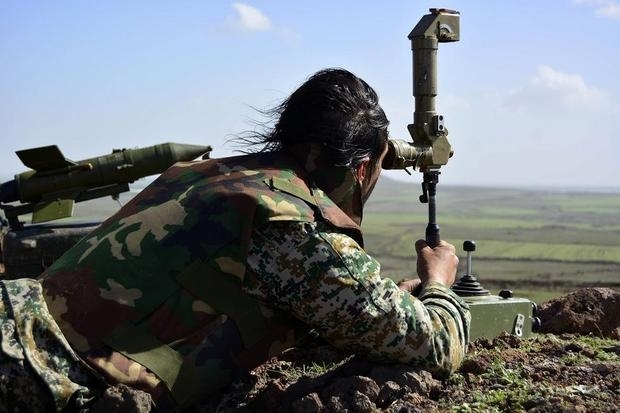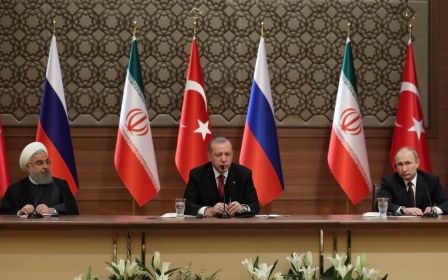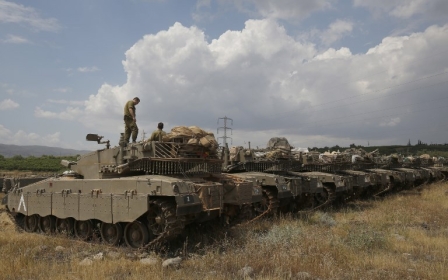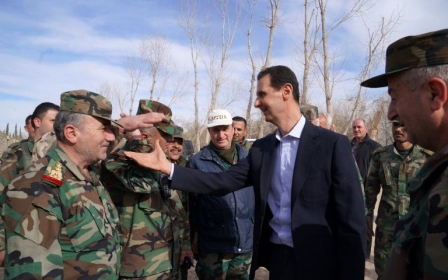Will the Syrian government strike a deal with the Kurds?
Senior members of the Kurdish-led Syrian Democratic Council (SDC) and its armed wing, the US-backed Syrian Democratic Forces (SDF), travelled to Damascus last week to hold negotiations with Syrian government officials.
The visit came a few months after the US announced its desire to withdraw from Syria, which could leave the SDF exposed and embolden its enemies. To avert such an outcome and secure its gains on the ground, the SDC appears to be in a hurry to reach an agreement with Damascus while its negotiating power is still strong.
But what will the negotiations focus on - and can an agreement be reached?
State persecution
Before the conflict, Syrian Kurds faced state persecution for years, with no constitutional recognition for their cultural or political rights. But the Syrian regime’s sole focus on fighting Sunni-led opposition groups post-2011 gave the Kurdish Democratic Union Party (PYD) and its armed wing, the People's Protection Units (YPG), the opportunity to establish de-facto autonomy in Kurdish-majority regions.
With the support of the US, the YPG was then able to establish in 2015 a multi-ethnic coalition to fight the Islamic State (IS) in Syria, expanding beyond its strongholds to areas such as Raqqa and Deir Ezzor. The SDF’s rapid gains against IS shaped its decision to create a political umbrella, the SDC, to establish a federal system in areas under its control, based on the leftist ideology of its backbone, the PYD.
The huge gap between what the two sides are trying to achieve makes it difficult to imagine they will be able to reach a substantive agreement any time soon
Although it controls more than a quarter of Syrian territory, the SDF has managed to avoid conflict with the Syrian regime, apart from rare skirmishes. At times, both actors have even coordinated closely to fight their common foe, rebel groups.
Despite the significance of the Kurdish-led delegation’s visit to Damascus, these are not the first negotiations between the two actors. The SDC, through its affiliates, has regularly coordinated with the Syrian regime on local administration issues in al-Hasakah province, where both entities coexist.
A deal was reportedly brokered between both sides in Hasakah, under which the Syrian regime provides its technology and expertise to increase oil production from the fields controlled by the SDF, in exchange for sharing revenues. Likewise, negotiations over the Tabqa dam in Raqqa allowed the state’s employees to maintain the dam in exchange for giving a percentage of the generated electricity to regime-held areas in Hasakah.
Demands for autonomy
To build on these local negotiations, Kurdish officials have announced their readiness to enter direct negotiations with Damascus without any preconditions. In addition, the SDC established a platform, the Democratic Autonomous Administration, to represent areas under its control in talks with the Syrian regime.
The agenda of the negotiations in Damascus remains unclear, but Kurdish officials have indicated that they will be more significant and comprehensive than previous talks. SDC co-chair Riad Darar said in an interview with Reuters that there is no set plan, but the talks will probably include matters of service provision, in addition to political and security issues. The SDC is expected to focus its demands on some form of autonomy or decentralised structure to maintain its agency and control over northwestern Syria.
As for the Syrian regime, it is expected to push for a deal that allows it to restore its authority over those areas without major compromise. In addition, the regime will likely push for the reintegration of the SDF and other affiliated security forces into the state’s regular armed forces.
The huge gap between what the two sides are trying to achieve makes it difficult to imagine they will be able to reach a substantive agreement any time soon.
Emboldened by its recent military gains, the regime appears more determined than ever to prevent the establishment of parallel centres of authority in Syria. This desire was clearly indicated in President Bashar al-Assad’s recent statement, describing the Kurdish-led administrations as “temporary structures”.
More details on what the regime is willing to offer can be found in a recent interview with Omar Usi, a Kurdish member of the regime’s parliament, who stated that the talks would focus on confining the Kurds' ambitions to the cultural sphere, with central government control restored in areas under their control. In other words, the regime wants the SDC to facilitate the entry of the Syrian army and the return of state institutions in areas east of the Euphrates, in exchange for constitutional recognition for the Kurdish community and its cultural rights.
Narrowing the gap
Such a deal, which does not offer the SDC the minimum of what it is willing to settle for, will most probably face certain rejection. Salih Muslim, the former co-chair of the PYD and a member of the SDC, has predicted that the Syrian regime wants to manipulate the ongoing talks to impose a surrender deal similar to the ones brokered with rebel groups. Muslim added that the SDC, unlike rebel groups who were forced to submit, would continue to fight against such a deal until the end.
To help gradually narrow the aforementioned gap, the negotiations will reportedly be divided into phases. The first will discuss restoring government services (electricity, civil registrations, health, etc) in SDC-held areas. Such mutually beneficial matters will be used as confidence-building measures. The second stage will discuss two border crossings with Iraq that are controlled by the SDF. Later stages will build on previous successes and discuss the major issues that need more time and effort.
Instead of presenting these negotiations as a potential breakthrough, it is more realistic to view them as an attempt to test the waters. Such talks can only lead to an agreement when there is enough pressure on one of the negotiating parties, most likely the SDC, to accept a slightly modified version of the deal that is now on the table.
- Haid Haid is a Syrian columnist and research fellow at ICSR, Chatham House and Atlantic Council. His research topics include security policy, conflict resolution, Kurds and Islamist movements. He tweets @HaidHaid22
The views expressed in this article belong to the author and do not necessarily reflect the editorial policy of Middle East Eye.
Photo: The Syrian Democratic Forces fought with US backing against the Islamic State group (Reuters)
This article is available in French on Middle East Eye French edition.
New MEE newsletter: Jerusalem Dispatch
Sign up to get the latest insights and analysis on Israel-Palestine, alongside Turkey Unpacked and other MEE newsletters
Middle East Eye delivers independent and unrivalled coverage and analysis of the Middle East, North Africa and beyond. To learn more about republishing this content and the associated fees, please fill out this form. More about MEE can be found here.






